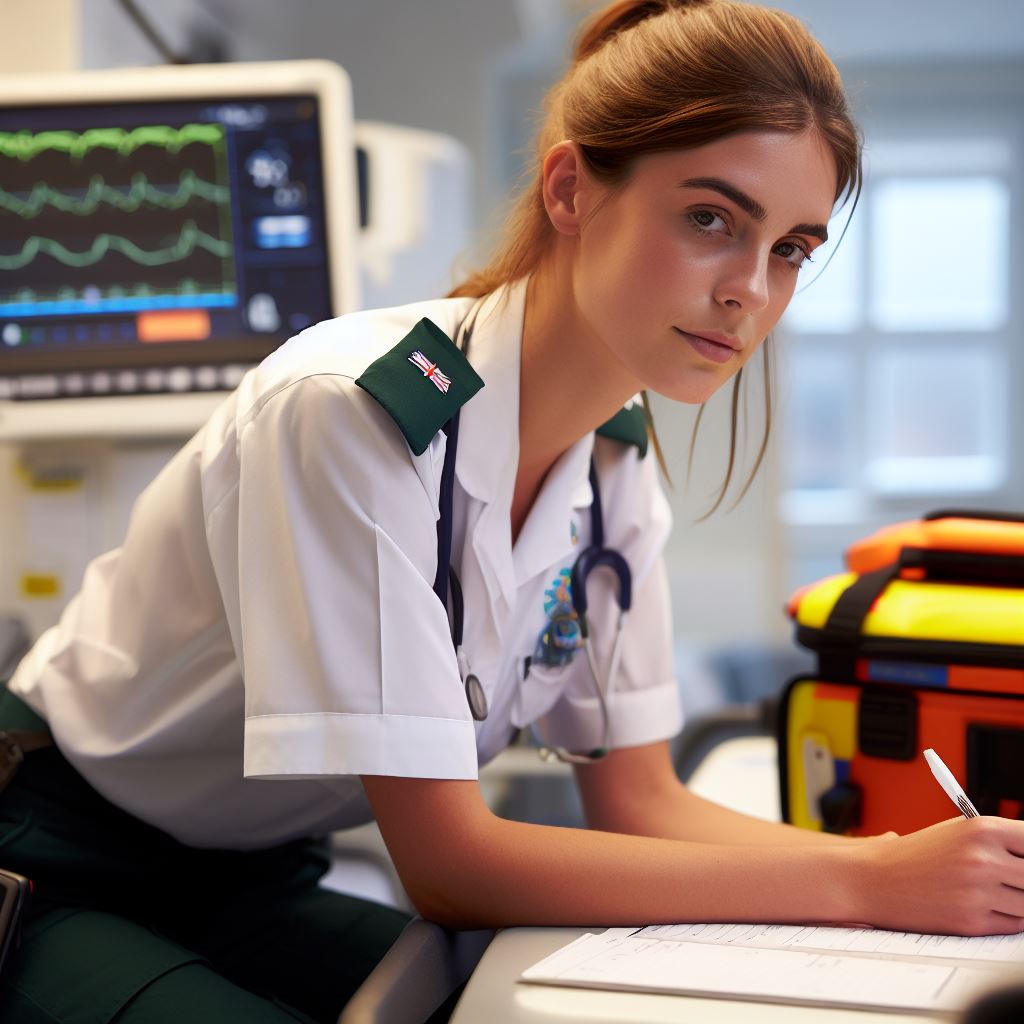Introduction
Medical technology plays a crucial role in healthcare, revolutionizing the way illnesses are diagnosed and treated.
With continuous advancements, the future of medical tech in the UK holds immense potential for improving patient outcomes.
From personalized medicine to telemedicine, these technologies offer numerous benefits in terms of accuracy, efficiency, and accessibility.
Advancements in Medical Technology
The future of medical technology in the UK looks promising, with numerous breakthroughs on the horizon.
For instance, artificial intelligence (AI) can enhance diagnostics by analyzing large datasets and identifying patterns that might be missed by human doctors.
This has the potential to improve early disease detection and treatment effectiveness.
Telemedicine allows patients to consult with healthcare professionals remotely, eliminating the need for in-person visits and reducing healthcare costs.
With the advent of wearable devices and sensors, individuals can monitor their health conditions in real-time, leading to better disease management and prevention.
Potential Benefits
The integration of medical technology in healthcare can streamline processes, allowing for more efficient and accurate delivery of care.
Electronic health records (EHRs) enable healthcare providers to access patient information seamlessly, enhancing coordination and reducing medical errors.
Moreover, robotic-assisted surgeries offer precision and minimally invasive procedures, resulting in shorter hospital stays and faster recovery times.
In the future, 3D-printing may enable the creation of customized implants tailored to each patient’s unique needs, improving treatment outcomes.
The future of medical tech in the UK is bright, with advancements in AI, telemedicine, wearable devices, and more.
These technologies have the potential to revolutionize healthcare, enhancing diagnostics, improving patient outcomes, and increasing accessibility to quality care.
Embracing these innovations will shape a brighter future for medical technology in the UK.
Current state of medical tech in the UK
The current state of medical tech in the UK is characterized by rapid advancements and the adoption of innovative solutions in the healthcare system.
Medical technology plays a crucial role in improving patient care, enhancing diagnostic capabilities, and optimizing treatment outcomes.
Existing Medical Technology Landscape in the UK
- Electronic Health Records (EHR): EHR systems streamline patient data management, enabling healthcare providers to access medical information efficiently.
- Telemedicine: Telemedicine has gained significant prominence, facilitating remote consultation, monitoring, and diagnosis, especially in rural areas.
- Artificial Intelligence (AI) in Medical Imaging: AI algorithms are applied to medical imaging, aiding in the early detection of diseases and improving accuracy of diagnoses.
- Robot-Assisted Surgery: Robotics technology assists surgeons in performing complex procedures with enhanced precision and reduced invasiveness.
- Mobile Health (mHealth) Apps: mHealth apps enable patients to track their health metrics, receive medication reminders, and access telehealth services.
- Big Data Analytics: The analysis of large volumes of health data leverages insights for personalized medicine, disease prevention, and public health planning.
Key Areas where Medical Tech is Making a Difference
Medical technology is making notable contributions across various areas in the UK healthcare system:
- Improved Patient Care: Implementing medical tech solutions enhances patient safety, reduces medical errors, and enables better coordination between healthcare professionals.
- Efficient Healthcare Delivery: Electronic systems and telemedicine increase access to healthcare services, especially for individuals living in remote areas.
- Enhanced Diagnosis and Treatment: AI-powered medical imaging tools assist radiologists in analyzing scans, leading to faster and more accurate diagnoses.
- Chronic Disease Management: With the help of mHealth apps, patients can effectively manage chronic conditions, share data with healthcare providers, and receive personalized care.
- Healthcare Research and Development: Medical technology promotes innovation, supports clinical trials, and fosters the development of novel therapeutic approaches.
- Remote Monitoring and Home Healthcare: IoT devices and wearables enable remote monitoring of patients’ vital signs, ensuring timely interventions and reducing hospitalizations.
Innovative Medical Tech Solutions in the UK Healthcare System
Several innovative medical tech solutions are currently being utilized within the UK healthcare system:
- Surgical Robotics: The da Vinci Surgical System allows for minimally invasive surgery with improved accuracy and reduced recovery time.
- Machine Learning Algorithms: AI algorithms are being developed to predict patient deterioration and optimize clinical decision-making processes.
- Health Monitoring Wearables: Devices such as smartwatches and fitness trackers provide individuals with real-time health data for proactive healthcare management.
- Virtual Reality (VR) in Rehabilitation: VR is employed for physical and cognitive rehabilitation, enhancing outcomes and patient engagement.
- Electronic Prescription Service (EPS): The EPS system allows for safer, more efficient electronic prescriptions, minimizing medication errors.
- Patient Data Security Solutions: Innovative cybersecurity measures ensure the privacy and integrity of sensitive patient information in digital systems.
In essence, the current state of medical tech in the UK showcases a dynamic landscape.
The implementation of various technologies, including EHR, telemedicine, AI, and robotics, is transforming the healthcare system.
With continued innovation and adoption of these solutions, the future looks promising in terms of improved patient care, more efficient healthcare delivery, and enhanced treatment outcomes in the UK.
Read: The Impact of Technology on Nursing in the UK
Emerging trends and technologies in medical tech
In recent years, advancements in technology have revolutionized various industries, and the field of medical tech is no exception.
The future of medical tech in the UK is promising, with several emerging trends and technologies set to shape the landscape. Let’s delve into some of these trends:
Artificial Intelligence (AI) and Machine Learning
AI and machine learning have the potential to drive significant improvements in healthcare.
With AI algorithms, medical professionals can analyze vast amounts of patient data, leading to more accurate diagnoses and personalized treatment plans.
Machine learning can also assist in predicting disease outcomes and identifying patterns that may not be evident to humans.
Robotics and Automation
The use of robotics and automation in medical procedures and patient care is gaining traction.
Surgical robots can assist surgeons in performing precise, minimally invasive procedures, reducing human errors and improving patient outcomes.
Automation in healthcare administration can streamline processes, enabling healthcare providers to focus more on patient care.
Wearable Devices and Personalized Medicine
Wearable devices, such as fitness trackers and smartwatches, are becoming increasingly popular.
These devices allow individuals to track their health metrics, monitor chronic conditions, and promote overall well-being.
Wearable technology enables personalized medicine, where treatment plans can be tailored to an individual’s specific needs based on real-time data.
Personalized UK Career Consulting
Receive tailored career guidance designed just for you. Get actionable steps and expert support to boost your career in 1-3 days. Take control of your career now.
Get StartedVirtual Reality (VR) and Augmented Reality (AR)
Virtual reality and augmented reality have the potential to revolutionize medical training and patient care.
VR can create immersive training experiences for medical professionals, allowing them to practice complex procedures in a safe environment.
AR can assist surgeons during surgeries by overlaying digital information onto the patient’s body, enhancing accuracy and reducing risks.
The implementation of these emerging trends and technologies in the UK’s medical tech sector comes with several benefits.
Firstly, it can improve patient outcomes by enhancing diagnoses, treatments, and surgical procedures.
This advancement in technology can also lead to cost savings by reducing the need for lengthy hospital stays or invasive procedures.
Moreover, the integration of AI and machine learning can assist medical professionals in making evidence-based decisions, such as drug recommendations and treatment plans.
This can improve overall patient care and reduce the risk of medical errors.
Additionally, wearable devices and personalized medicine empower individuals to take charge of their health, leading to a more proactive approach to wellness.
However, with these advancements come challenges that need to be addressed. One concern is the ethical use of AI, as it raises questions about patient privacy, data security, and algorithm bias.
Striking a balance between technology and human interaction in healthcare delivery is crucial to ensure patient trust and maintain the essential human touch in medical care.
In review, the future of medical tech in the UK holds exciting possibilities.
Emerging trends such as artificial intelligence, robotics, wearable devices, and virtual reality offer tremendous potential for improving healthcare outcomes.
However, it is essential to navigate the associated challenges mindfully, ensuring ethical use and maintaining a patient-centered approach.
Read: UK Surgeons’ Salary Guide: Expectations vs Reality

Challenges and Limitations
As medical technology continues to advance, several challenges and limitations need to be addressed and considered in the UK healthcare system.
These challenges encompass regulatory and ethical concerns, data privacy and security, and potential drawbacks of excessive reliance on technology.
Regulatory and Ethical Concerns
- The use of medical tech raises concerns about proper regulation to ensure safety and efficacy.
- Regulatory bodies must assess and validate new medical technologies before implementation.
- Ethical considerations include the potential for unequal access to medical tech, exacerbating existing health inequalities.
- The use of artificial intelligence (AI) for diagnostic purposes also raises ethical questions.
Importance of Data Privacy and Security
- Medical tech relies heavily on data collection and sharing, leading to concerns about patients’ privacy.
- Stringent measures need to be in place to protect sensitive medical data from unauthorized access.
- Data breaches could compromise patients’ confidentiality and trust in the healthcare system.
- Strict regulations and protocols for data encryption and storage are crucial to maintain privacy.
Potential Drawbacks of Excessive Reliance on Technology
- Although medical tech offers numerous benefits, overreliance on it can lead to reduced human interaction.
- Technology should complement healthcare professionals, not replace their expertise and empathy.
- Limited access to medical tech and lack of digital literacy can further widen healthcare disparities.
- Effects of technology malfunction or errors in medical algorithms must also be considered.
Despite these challenges and limitations, the future of medical tech in the UK remains promising.
By addressing regulatory and ethical concerns, prioritizing data privacy and security, and focusing on a balanced approach.
The potential benefits of medical tech can be maximized while minimizing associated risks.
The UK government and regulatory bodies must establish comprehensive frameworks and guidelines to ensure the safe and ethical implementation of medical technologies.
Collaborating with industry experts, researchers, and healthcare professionals is crucial to drive innovation and maintain public trust.
Healthcare providers should prioritize training and support for healthcare professionals to effectively adopt and utilize medical tech in their practices.
This includes digital literacy programs and continuous professional development to enhance skills in utilizing technology and maintaining a patient-centered approach.
It is important to recognize that medical tech is not a solution in itself but rather a tool to enhance healthcare delivery.
A balanced approach that combines technology with human expertise will result in improved patient outcomes and a more efficient healthcare system.
In a nutshell, while challenges and limitations exist regarding medical tech in the UK, strategic measures can be implemented to address these concerns.
By prioritizing regulatory oversight, data privacy, and striking a balance between technology and human interaction.
The future of medical tech in the UK can revolutionize healthcare while ensuring safety, ethics, and patient-centricity.
Read: Advancing Your Nursing Career in the UK
Opportunities and Future Prospects
Discussing the Potential Benefits and Opportunities Brought by Medical Tech Advancements
Medical technology advancements have the potential to revolutionize healthcare in the UK.
The introduction of new devices, software, and techniques opens up exciting opportunities for both patients and healthcare providers.
Your Dream Job Starts with a Perfect CV
Get a tailored CV and cover letter that captures your unique strengths and stands out in your industry. Let us help you make an unforgettable first impression.
Get StartedOne significant benefit of medical tech advancements is the improvement in patient outcomes. Advanced diagnostic tools allow for more accurate and timely diagnoses.
This means that patients can receive appropriate treatment faster, increasing their chances of recovery and leading to better health outcomes overall.
Additionally, medical tech advancements have the potential to reduce healthcare costs.
Early detection and intervention can prevent the progression of diseases, subsequently reducing the need for costly treatments.
Innovative technologies can streamline healthcare processes, leading to more efficient and cost-effective care.
Potential to Improve Patient Outcomes and Reduce Healthcare Costs
Remote patient monitoring and telemedicine are two promising areas where medical tech advancements can improve patient outcomes and reduce healthcare costs.
Remote patient monitoring allows healthcare providers to remotely monitor patients’ vital signs, ensuring that any deterioration or irregularities are detected early, preventing complications and hospital admissions.
Telemedicine, on the other hand, enables patients to consult with healthcare professionals without the need for in-person visits.
This not only saves time and travel costs for patients but also reduces the burden on healthcare facilities.
Telemedicine expands access to healthcare services, particularly for individuals in rural or remote areas who may have limited access to specialized care.
Potential for Medical Tech to Revolutionize Healthcare Delivery in Rural Areas
Medical tech advancements have the potential to address the healthcare access challenges faced by individuals in rural areas.
With the development of telemedicine and other digital health solutions, patients in remote locations can receive high-quality healthcare without the need to travel long distances.
Telemedicine enables remote consultations, allowing patients to access specialized care that may not be available locally.
This prevents patients from having to endure long journeys and reduces the strain on rural healthcare facilities.
By utilizing medical tech, healthcare providers can extend their reach and provide quality care to underserved communities.
Gain More Insights: Medical Tech Job Market Trends in UK
Role of Medical Tech in Disease Prevention and Early Detection
In addition to improving patient outcomes and reducing healthcare costs, medical tech advancements play a critical role in disease prevention and early detection.
Advanced screening technologies and genetic testing enable healthcare providers to identify individuals at high risk of certain diseases, allowing for early intervention and preventive measures.
By detecting diseases at their earliest stages, medical tech enables healthcare professionals to implement timely treatment plans, increasing the chances of successful outcomes.
Preventive measures can be taken, such as lifestyle interventions or vaccinations, to mitigate the risk of developing certain diseases altogether.
In fact, the future of medical tech in the UK holds immense potential for improving patient outcomes, reducing healthcare costs, addressing healthcare access challenges.
And enhancing disease prevention and early detection initiatives.
As technology continues to advance, it is crucial for healthcare providers, policymakers.
And industry stakeholders to harness these opportunities and ensure that the benefits are realized for all patients across the country.
Read: How UK Nurses Balance Work and Personal Life
Conclusion
The future of UK medical tech promises groundbreaking advancements. Technology holds immense potential. It’s a catalyst for enhancing patient outcomes.
Throughout this discourse, the potential for medical technology to revolutionize healthcare emerges vividly.
Its transformative power extends beyond innovation, reaching into the very fabric of healthcare delivery.
To fully harness this potential, further research and investment are imperative.
The UK stands at the brink of a transformative era in healthcare, poised to leverage technology for unparalleled patient care.
Optimize Your LinkedIn for Success
Boost your LinkedIn profile with a professional bio, keyword-rich headline, and strategic recommendations that attract recruiters. Stand out from the crowd and get noticed.
Optimize NowEncouraging continued exploration and investment in medical technology will unlock its full potential, shaping a future where advancements improve not just treatment but the overall well-being of individuals across the UK.
The road ahead is ripe with possibilities, and embracing these innovations will undoubtedly redefine the landscape of healthcare in the UK.
[E-Book for Sale]
500 Cutting-Edge Tech Startup Ideas for 2024 & 2025: Innovate, Create, Dominate
$19.99 • 500 Tech Startup Ideas • 62 pages
You will get inspired with 500 innovative tech startup ideas for 2024 and 2025, complete with concise descriptions to help you kickstart your entrepreneurial journey in AI, Blockchain, IoT, Fintech, and AR/VR.




